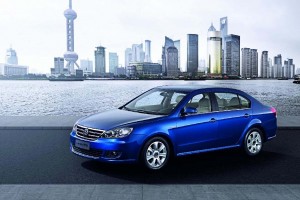Surging global stock markets slipped back this week as China released surprisingly weak economic data – but one sector of the vast Asian nation’s economy remains strong, Chinese car sales surging 40% for the first two months of 2013 after an unexpectedly weak performance last year.
For some carmakers, Chinese demand appears to be surging as they bring on new products, while for others, it is taking new discounts to help bolster sales.
But industry analysts continue to worry about what may happen as government regulators come under increasing pressure from both the public and a new cadre of Communist Party leaders to tighten environmental regulations in the wake of record pollution levels in the capital Beijing and other parts of the country. As TheDetroitBureau.com recently reported, stricter automotive emission rules – possibly including a press for more battery cars – are being actively considered.
The 40% year-to-date increase in overall Chinese car sales comes despite a drop in February as the Chinese celebrated the Lunar New Year, a week-long holiday during which little or no business is transacted across China.
General Motors’ China sales rose 7.9% to 525,835 vehicles during January and February, widening its lead over Toyota Motor Co. in what is now the world’s largest national automotive market.
Toyota, Nissan Motor Co. and Honda Motor Co. each reported declines in January-to-February sales, as Japanese auto brands continued to struggle with a consumer backlash ignited last summer by a territorial dispute over a group of islands in the East China Sea.
German brands gained market share in China in February, accounting for 20% of passenger-vehicle sales last month, followed by American, Japanese and South Korean nameplates, according to estimates prepared by an association of Chinese auto manufacturers.
Volkswagen AG’s Audi, the top-selling luxury brand in China, said its China sales rose 16% in the first two months. But Daimler AG’s Mercedes-Benz said its January-February sales in China and Hong Kong fell 39% from a year earlier to 26,829 vehicles.
Mercedes has faced unexpected problems over the last year that have forced it to sharply ramp up incentives – and to overhaul its Chinese management structure.
Sales by local Chinese brands remain weak and the Chinese government is under pressure to reduce auto sales as part of an effort to clean up a growing air pollution problems, as well as to reduce traffic congestion in major cities.
(Will China’s auto boom go bust as the nation addresses its air pollution problems? Click Here for that story.)
Nonetheless, Chinese demand for vehicle license plates in Shanghai still outstrips supply despite auction prices exceeding RMB80,000 ($12,865), which are “too expensive,” Shanghai Party Chief Han Zheng said at the People’s Congress.
Meanwhile, passengers aboard China’s Spring Airlines Co., the nation’s biggest privately-owned carrier, may soon be able to buy cosmetics, jewelry — and cars.
Spring plans to start selling Chinese-branded automobiles priced from about RMB 100,000 ($16,000) by as early as next month, Zhang Wu’An, a spokesman for the Shanghai-based company, said. Spring Air is still in talks over details such as which brands and models to offer, Zhang said, declining to give details.
“We wanted to start in-flight sales a few years ago, and decided cars are suitable for our passengers,” Zhang said. “Car sales are very popular in Shanghai and our passengers can have time during their flight to study details of the models available.”

